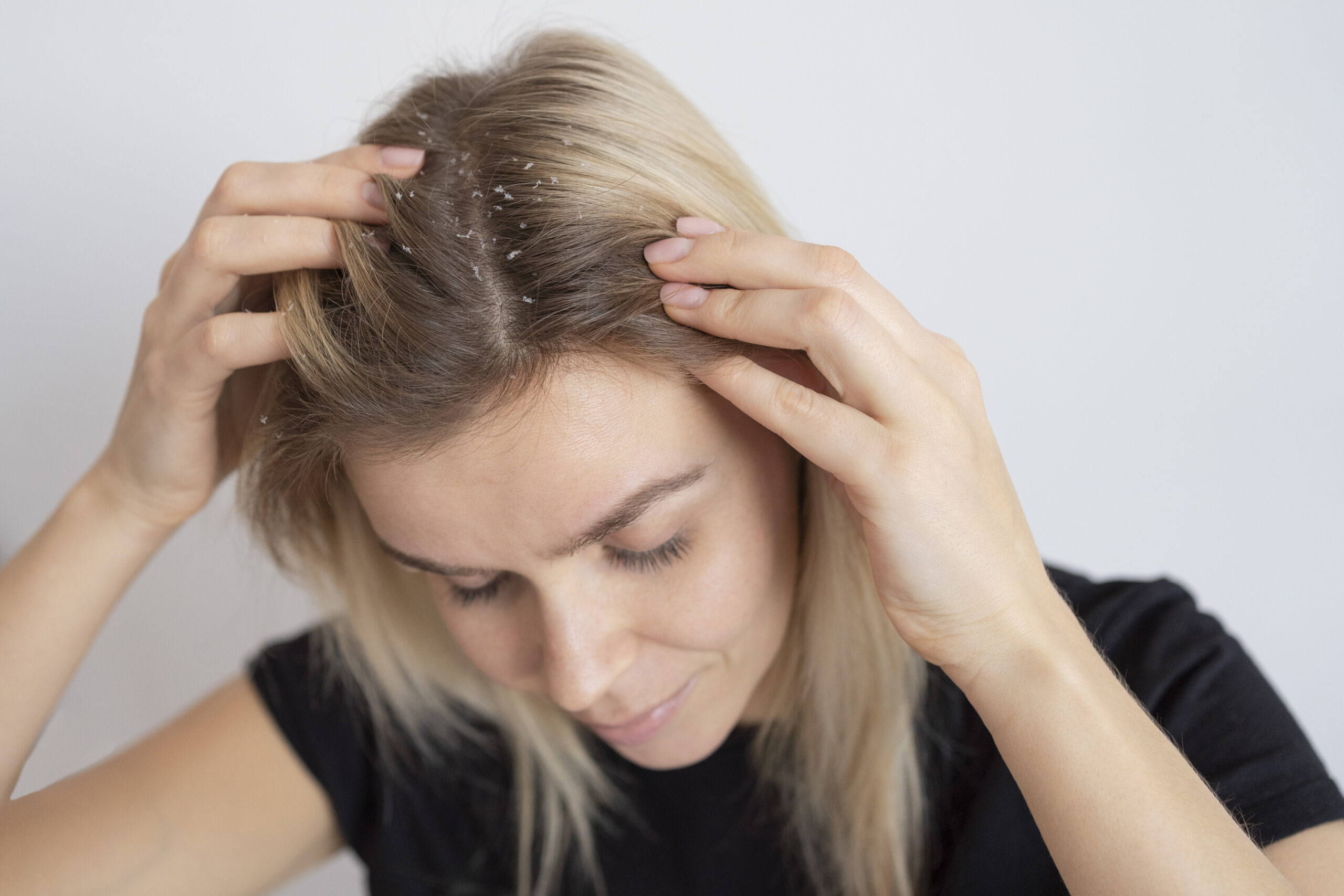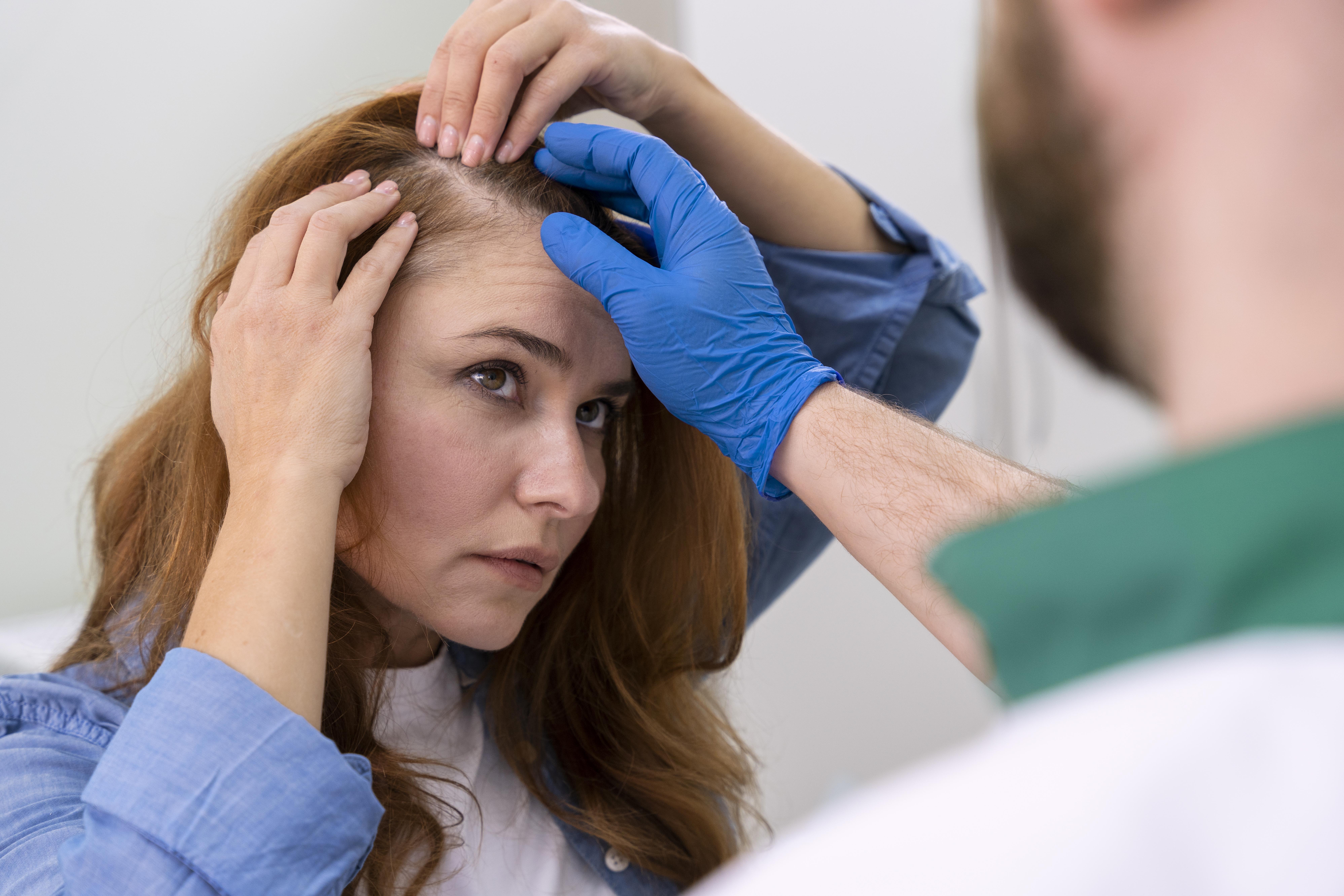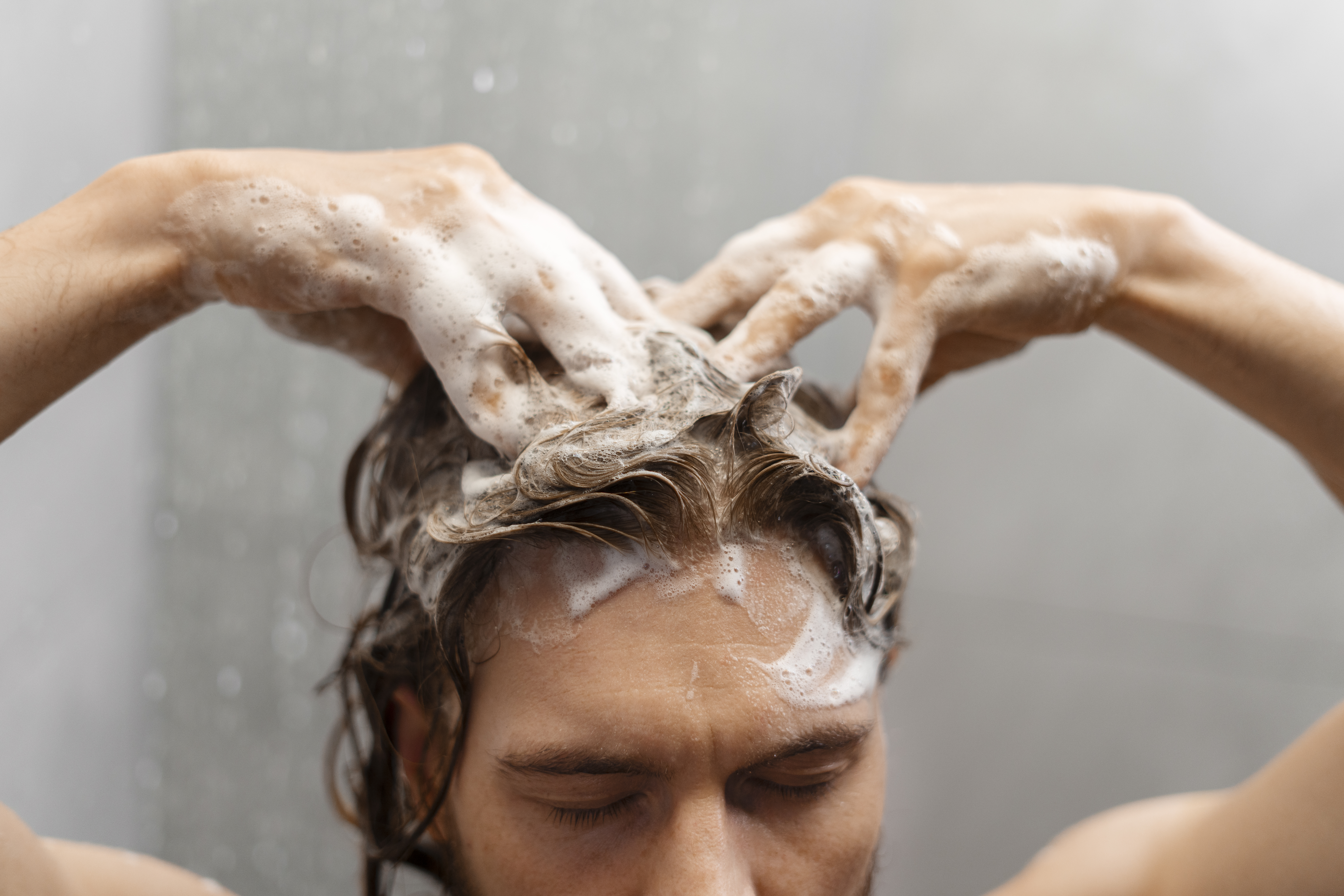Dry skin can manifest anywhere on the body, with common areas being the face, head, elbows, knees, hands, and feet. However, in many cases, it influences the head scalp. This condition is characterized by a deficiency of lipids and inadequate hydration, making proper dry skin care crucial.
The issue of dry scalp often results in:
To mitigate these effects, being familiar with various methods for moisturizing the dry scalp is essential. Combining home remedies and suitable skincare products may be the most effective approach to addressing this concern.

Dry scalp and dandruff![]() often exhibit similar symptoms, leading to confusion. Distinguishing between the two is crucial for determining the appropriate course of treatment. Natural shedding of dead skin cells occurs on the scalp, but disruptions in this process can lead to issues. Dandruff is characterized by an accelerated renewal of epidermal cells, attributed to the excessive proliferation of pathogenic Malassezia fungi. Scales are then formed and are visible in the hair and clothes.
often exhibit similar symptoms, leading to confusion. Distinguishing between the two is crucial for determining the appropriate course of treatment. Natural shedding of dead skin cells occurs on the scalp, but disruptions in this process can lead to issues. Dandruff is characterized by an accelerated renewal of epidermal cells, attributed to the excessive proliferation of pathogenic Malassezia fungi. Scales are then formed and are visible in the hair and clothes.
Also, when the scalp is dry, it begins to flake more. However, the epidermis that falls off dry skin is smaller and more dry than dandruff. Therefore, you should first moisturize the skin – treatment aimed at combating dandruff will not bring results. Symptoms caused by dry scalp may intensify and disappear at various times; dandruff caused by a fungal infection usually does not go away on its own without proper treatment – dandruff can be dealt with at home using anti-dandruff shampoos. When this does not help, you should see a doctor who will diagnose the cause of your flaky scalp.
A dry scalp is not solely indicative of skin issues but can also signal a condition – dandruff. It may also result from improper scalp care, such as using overly aggressive shampoos, styling products, or excessive cosmetic hair treatments.
Symptoms of this condition include scalp itching and a burning sensation, noticeable white or yellowish “flakes” of dandruff on the arms and shoulders, and redness of the scalp.
An abundance of Malassezia yeast![]() may cause dry scalp and itching, resulting in accelerated epidermal exfoliation on the scalp, leading to dryness, occurring as frequently as every seven days for individuals with this dermatological issue. In contrast, the epidermal replacement process occurs every 28 days in healthy individuals.
may cause dry scalp and itching, resulting in accelerated epidermal exfoliation on the scalp, leading to dryness, occurring as frequently as every seven days for individuals with this dermatological issue. In contrast, the epidermal replacement process occurs every 28 days in healthy individuals.
A dry scalp is characterized by delicate, tense, dull, rough, and excessive exfoliation. Individuals with this skin type often experience burning, itching, and discomfort, and it is prone to damage and sensitivity to cosmetic and detergent chemicals.
The underlying causes of dry scalp include impaired water binding and retention in the epidermis layer, insufficient secretion from the sebaceous glands leading to lipid layer losses, and decreased moisture and elasticity. Additionally, genetic predisposition, incorrect habits, and exposure to external factors contribute to atopic dermatitis.
Dry skin is commonly attributed to sunlight exposure, inadequate skin care, unsuitable cosmetics, tanning bed use, poor diet, prolonged exposure to air-conditioned or heated environments, and contact with detergents.
The following are factors that can contribute to the development of a dry scalp:
Understanding these factors can help address and manage dry scalp conditions![]() .
.
Dry scalp treatment![]() depends on the cause of the condition. If hair products have forced the situation, you may have to change your self-care. For example, better rinse off the shampoo cause the one left behind after you wash your hair could irritate the scalp.
depends on the cause of the condition. If hair products have forced the situation, you may have to change your self-care. For example, better rinse off the shampoo cause the one left behind after you wash your hair could irritate the scalp.
If a more severe health problem is causing your condition, visit the specialists. A dermatologist can diagnose your condition and help fix your dry scalp.

You can also try some home remedies![]() . Remember never to use home techniques as a replacement for specialist treatment.
. Remember never to use home techniques as a replacement for specialist treatment.
The most important minerals for hair health are zinc and copper. For example, buckwheat is a product rich in zinc. It is worth knowing that this microelement, like copper, is found in greater amounts in the hair than in the bloodstream. When we do not provide the appropriate portion of zinc and copper in the diet, the body replenishes its reserves from the tissues that are least important from the survival point of view, i.e., hair and nails. Those deprived of them become brittle and dull. Zinc deficiencies also increase hair loss; copper deficiencies contribute to structural changes and discoloration.
The basis of hair and scalp care is always a shampoo matched to the condition and possible problems. Too aggressive may disturb the natural functioning of the skin, its microbes, and the hydrolipid coat, which is responsible for, among others, maintaining the appropriate level of hydration. Daily, it is worth choosing natural products, rich in plant complexes and extracts, which will cleanse gently, not stick to the hair or remain on the skin, and will not cause flaking and itching.
The following will help fight these ailments:
The cosmetics we use during each wash should also be based on delicate cleansing substances. It is easy to recognize such preparations because they have a natural color and are matte.
In addition to choosing the right shampoo, how we wash our hair is also significant.
Too warm or even hot water can lead to dryness. Cool (but not cold) will be beneficial and will not worsen the problem of itching and peeling. We should not pour shampoo directly onto the scalp and hair. It is better to apply it in the palm of your hand, dilute it with water, and lather it.
The amount of shampoo needed to wash your hair is small. It is better to repeat the action than to overdo it with too much cosmetic at once. The shampoo is primarily used to cleanse the skin, so we apply it only on it, avoiding the hair along its entire length. They only need the amount that gets into them when rinsing and conditioning. We should rinse the shampoo thoroughly so no residue remains on the skin and hair.
The frequency of washing should be adjusted to individual needs. Do not make it too greasy, which may lead to irritation. It does not mean that everyone will need daily washing.
You can help yourself with a gentle massage, which will additionally strengthen microcirculation. Massage does not mean intense rubbing, which could damage the hair. The movements should be gentle and pleasant. During the massage, do not scratch the skin with your nails.

You can use scalp peeling once a week. For this purpose, you should use appropriate cosmetics that remove the excess calloused epidermis, unblock the hair follicle openings, and thus make your hair and skin better nourished after using shampoo or conditioner. To start with, you should choose gentle cosmetics. In addition to peelings, you can also try oiling not only your hair but also your scalp. The hair serum can be gently rubbed into the hair from the roots. An additional dose of emollients may positively impact the condition of the scalp.
A dry scalp is often caused by excess sebum. We will get rid of this problem when we use lemon juice. Thanks to it, your scalp will also stop itching. To prepare a homemade mask, add three tablespoons of natural yogurt (optional) to two tablespoons of freshly squeezed lemon juice, massage it into the scalp, and leave for 10-15 minutes, then wash off with a delicate shampoo. A lemon juice mask is a quick answer to how to take care of your scalp because lemons are relatively cheap and available.
First of all, check what the deterioration of the scalp condition by. Avoid external factors that may worsen the condition of the scalp until you see improvement – e.g., give up hot styling and hot air drying.
If you are unsure whether peeling and itching of the epidermis is a symptom of dandruff or dry skin, consult a dermatologist. You can also use an anti-dandruff shampoo for dry dandruff – if it does not bring the desired improvement, it is a sign that it is a symptom of dryness and not a disease caused by excessive growth of yeast.
Use a moisturizing shampoo for daily care. Avoid oiling your hair – applying too much oil may clog the hair follicles and irritate dry skin.
A common symptom of skin irritation and dryness resulting from improper care is itching and peeling of the epidermis in the occipital area (this is where poorly rinsed shampoo and conditioner settle).
If you are allergic to shampoo ingredients, symptoms such as contact eczema may also appear on the face, e.g., on the eyelids and forehead (the cosmetic comes into contact with them when rinsing).
Carefully read the ingredients of the scalp and hair cosmetics you use – avoid products with strong scents, intense foaming, and the addition of large amounts of emulsifiers. Look for gentle shampoos that can be safely used on sensitive skin.
Remember to apply the conditioner or mask to your hair, not your scalp – if not rinsed properly, they can settle on, irritate, and dry it out. A moisturizing mask or conditioner will help dry hair, but not the skin. You can also use professional scalp and hair moisturizing treatments in the hairdressing salon – it is worth repeating them regularly, at least once a month.
To improve oxygenation in the scalp, use a gentle trichological peel once a month, which will help cleanse the scalp and improve its absorption of moisturizing ingredients.
Ensure your environment is correctly humidified, e.g., using an air humidifier. Pay attention to whether your scalp changes with age – and match the shampoo type you use.